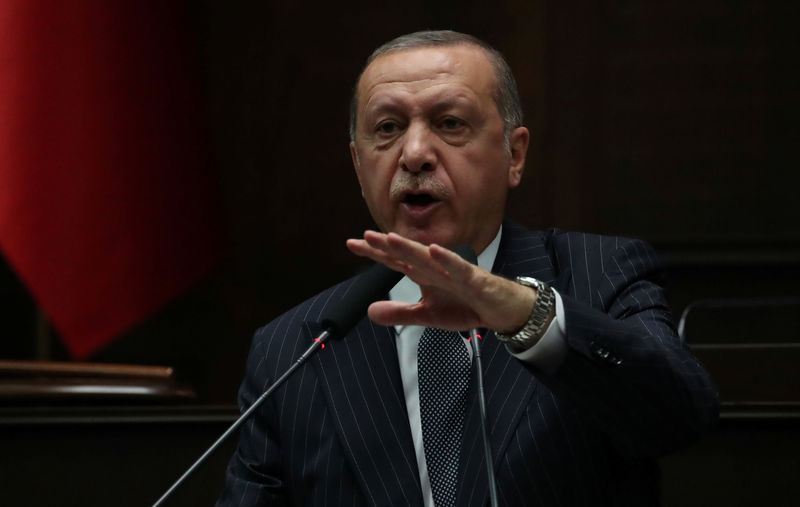 © Reuters. Turkish President Tayyip Erdogan addresses members of parliament from his ruling AK Party during a meeting at the Turkish parliament in Ankara
© Reuters. Turkish President Tayyip Erdogan addresses members of parliament from his ruling AK Party during a meeting at the Turkish parliament in AnkaraBy Tuvan Gumrukcu
ANKARA (Reuters) – Turkish President Tayyip Erdogan said on Saturday he had ordered his ministers to stop receiving consulting services from U.S. firm McKinsey, after a government deal with it came under fire from the main opposition.
Last month, Finance Minister Berat Albayrak, who is also Erdogan’s son-in-law, said Turkey had decided to work with McKinsey to help implement a new medium-term economic program.
Kemal Kilicdaroglu, leader of the main opposition Republican People’s Party (CHP), this week accused Erdogan of siding with U.S. firms at a time when relations with Washington have been hit by the detention of an American pastor in Turkey and other issues.
Albayrak had defended the agreement with McKinsey earlier this week, saying anyone who did not want Turkey to work with McKinsey was “either ignorant or a traitor”.
On Saturday, Erdogan appeared to have scrapped the deal, however.
“This person (Kilicdaroglu) is trying to corner us by asking questions about a consultancy firm that has been paid in full to help our economic management,” Erdogan told members of his ruling AK Party.
“In order to not give him that chance … I told all my ministers to no longer receive consultancy from them (McKinsey),” he said.
McKinsey was not immediately available for comment.
TURKISH FIRMS
Later on Saturday, Kilicdaroglu said Erdogan had been forced to cancel the deal after failing to disclose the details of the agreement that he had asked for earlier in the week.
“I asked you 10 questions, told you to answer them. He read them but couldn’t handle it. He can’t answer and now he has been forced to cancel the deal,” Kilicdaroglu said.
Omer Celik, the spokesman for the ruling AK Party, told reporters at a party summit chaired by Erdogan that the president had told his party and ministers to receive consulting services from Turkish firms from now on.
He also said there had not been a signed deal between the government and McKinsey, but rather an agreement between the U.S. firm and some ministries.
Strained ties with the United States have exacerbated pressures on Turkey’s lira, which plunged more than 40 percent this year over concerns about relations with Washington, Erdogan’s influence on the central bank and the bank’s ability to rein-in double-digit inflation.
Erdogan has cast the devaluation in the lira as an “economic war” against Turkey by foreign powers, and has warned of action against those believed to be speculating on the economy or taking advantage of fluctuating exchange rates.
“Despite being subject to one of the biggest economic attacks in history, we managed to largely pick things up within two months,” Erdogan said on Saturday.
Turkey was open to investment and support, as long as any deals did not impinge on its sovereignty, Erdogan added.
Erdogan recently paid an official visit to Germany as part of Turkey’s attempts to mend ties with Europe at a time when the row with Washington has led to reciprocal trade restrictions and sanctions.
Kilicdaroglu, however, said Erdogan and his ministers had been “begging for borrowed money” on international visits.
Erdogan responded that his government had been recruiting investors during his visits.
Source: Investing.com
























